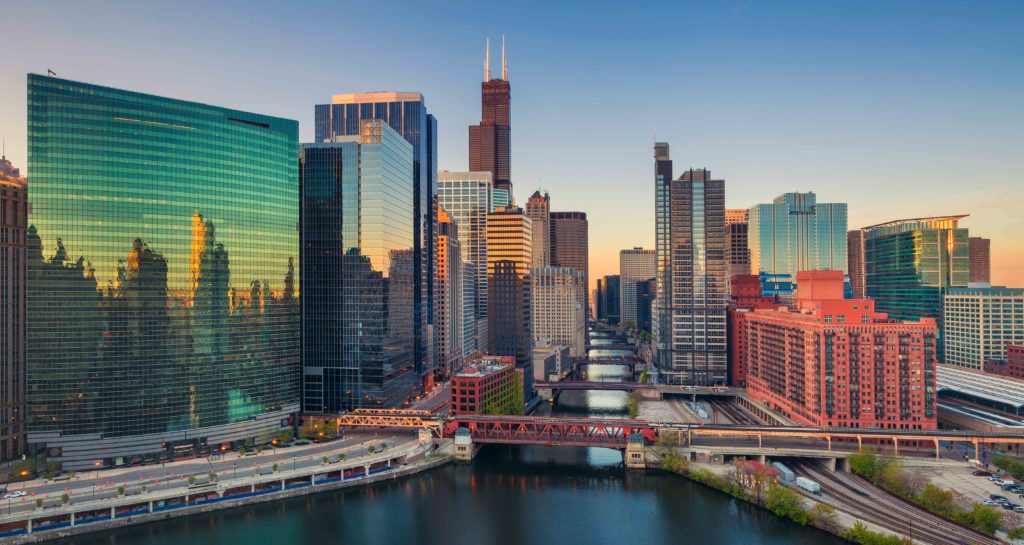In 2019, the recycling rate in Chicago stood at just 8.28% according to city statistics. This falls far short of the national recycling rate of 32.1%, and even further behind other cities in the US, some of which boast recycling rates of 70% or higher. However, unlike other cities in the US, Chicago hasn’t yet implemented its own recognizable zero waste program.
The good news is that this hasn’t stopped a whole ecosystem of zero-waste projects appearing in Chicago and across Illinois, with private and community-driven initiatives, from trash-free cleaning brands to an innovative tool library, helping foster zero waste in Chicago.
Here we look at the current status of zero-waste thinking in the city and how stores, non-profits, and local government are beginning to shift to zero-waste.
Zero-Waste Stores in Chicago
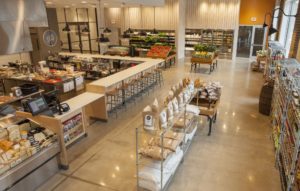
Source: pinterest
Private initiatives have been a driving factor towards a zero-waste Chicago, with several brands, shops, and startups reflecting consumer demand for less waste. A few of the most notable zero-waste shops in Chicago to appear in recent years are focused on delivering not only more sustainable goods, but healthier ones too.
Zefiro
One of the first zero-waste stores in Chicago, Zefiro stocks a large number of products based on very simple criteria:

Source: zefirowaste
- The product is an alternative to a single-use product.
- It is better for both the consumer and the planet.
- The product doesn’t represent a difficult change that will need to be incorporated into your life.
- The products are affordable alternatives.
The project was founded by Carley Pulford after she recognized that an increasing number of people were looking for zero-waste alternatives in Chicago, and now offers everything from bottle brushes to beard combs.
What’s more, Zefiro is a member of 1% for the Planet, meaning they are committed to donating 1% of total annual sales to support environmental causes.
While the majority of goods available from Zefiro bear their own brand name, when it comes to cleaning supplies such as dish soap, laundry detergent, personal care products and more, this zero-waste Chicago shop opted for another local business: Meliora Cleaning Products.
Meliora Cleaning Products
This Chicago zero-waste brand was born of a desire by founder Kate Jakubas to create more transparent cleaning products after she realized that it was nearly impossible to be a responsible consumer and reduce harm. The company prides itself on disclosing every ingredient in every product as well as lobbying for more transparent cleaning product labeling across the US.
Meliora home cleaning and laundry products are MADE SAFE certified, which means they are tested to ensure they don’t build up in the environment or people’s bodies, as well as being tested for aquatic toxicity. They include no synthetic fragrances, dyes, optical brighteners, or preservatives and, much like Zefiro, have a few core principles that all their products must meet:
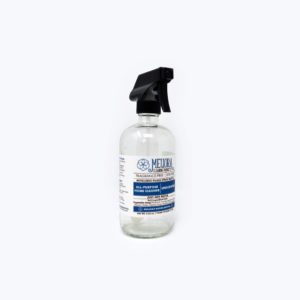
Source: zerowaste.com
- It works — It gets homes and clothes clean.
- It is people-friendly — It won’t cause harm within the home.
- Planet-friendly — It doesn’t cause damage at the end of its life.
Additionally, this zero-waste Chicago brand has B Corp Certification, commits 2% of its revenue to environmental causes through 1% For the Planet and Women’s Voices for the Earth, and has the Leaping Bunny certification that indicates no animal testing. A big part of zero waste is also keeping things local, which Meliora Cleaning Products does by producing and packaging all their goods on the West Side of Chicago.
Eco & The Flamingo
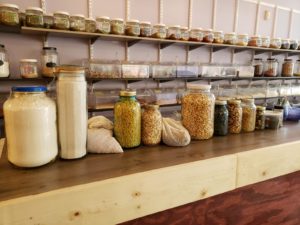
Source: ecoandtheflamingo
A new zero-waste grocery store in Chicago, Eco & The Flamingo launched in 2020 with the aim of reducing plastic by offering products in reusable, compostable, or recyclable packaging alongside package-free options. The project began back in 2019 but launched in earnest in 2020 in response to the sharp increase in single-use plastics that the Covid-19 pandemic brought.
The online and in-person store offers health, personal care, and beauty products as well as zero-waste cleaning products, kitchen products, herbal goods, and more.
The Dill Pickle Food Co-Op
The Dill Pickle Food Co-Op is a great option when looking for a zero-waste bulk store in Chicago. It stocks dry goods such as grains, beans, nuts, seeds, and flour as well as liquid groceries like olive oil and cleaning products within its comprehensive bulk section.
What’s more, this is a real cooperative, meaning they are “based on the values of self-help, self-responsibility, democracy, equality, equity, and solidarity” and stand by their commitment to creating a community that has:
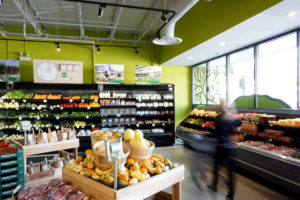
Source: dillpickle.coop
- Equitable economic relationships
- Positive environmental impacts
- Inclusive practices
One of the fundamentals of the Dill Pickle is community: “Co-operatives work for the sustainable development of their communities through policies approved by their members.”
Chicago Zero Waste Community Projects
In addition to commercial ventures within the Chicago zero-waste community, there are also community initiatives that aim to either cut waste or promote more sustainable ways of living.
Chicago Tool Library
Founded in mid-2019, this project aims to increase access to tools in the Chicago community, helping grow knowledge, confidence, and skills as well as reducing the “wasteful consumerism” involved in each person buying their own tools. The tool library reduces the footprint of tool manufacturing and diverts unwanted tools from landfill, moving towards zero waste in Chicago.
The Chicago Tool Library requires potential borrowers to:
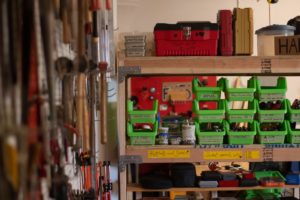
Source: chicagotoollibrary
- Be a resident of the city of Chicago
- Fill out a very brief membership application
- Pay an annual membership fee
The membership fee is not fixed, however, and instead is done on a sliding scale, with a recommendation that fees equate to $1 for every $1,000 of annual income—all based on an honor system. The expected “traditional” tools are available to borrow, as well as an array of others such as for food preparation, jewelry making, audio and visual production, and numerous other activities.
Not to leave those with green thumbs out of the mix, the Chicago Tool Library also offers a selection of vegetable, herb, and flower seeds, which borrowers take, grow, and then return new seeds from their harvest.
The WasteShed
The WasteShed aims to provide zero-waste Chicago residents with a host of repurposed art, craft, and school materials, as well as acting as a center for activities related to sustainability, art, craft, and education. In the project’s own words, they connect Chicagoans who are looking to:
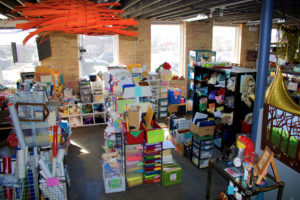
Source: The WasteShed
- Live more sustainably
- Seek inspiration in unconventional materials
- Get the most out of the resources they have on hand
- Make projects at a low cost
The WasteShed is an art-based initiative, but sustainability is the ultimate goal, and while many projects focus on reducing every-day waste, this community enterprise looks at how people can encourage creativity without impacting the environment.
The City of Chicago’s Struggle with Zero Waste
The biggest potential step towards zero waste in Chicago was a Waste Characterization Study and a Waste Diversion Study carried out more than a decade ago. At the time, they found an overall diversion rate of 45% across three types of waste collection:
- Department of Streets and Sanitation (DSS)-Collected Residential (4 units or less)
- Privately-Collected (residential buildings of 5 units or more, institutional, industrial and commercial)
- Construction & Demolition (C&D)
This overall figure was heavily skewed by Construction and Demolition waste, which already had a 65% diversion rate, while the DDS-collected and private collected waste stood at just 8% and 19% respectively.
What’s more, almost 60% of the DDS- and privately-collected waste was paper and organic material, both of which could be targeted to greatly improve the city’s waste management. The report speculated that with changes, the maximum diversion rates could be as high as 43% for DDS- and 42% for privately-collected waste, hinting at what would have been a significant step towards a zero-waste Chicago. However, no real progress was made in achieving these goals.
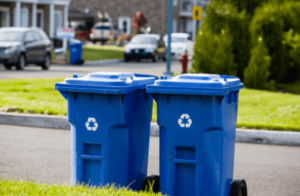
Source: chicago.gov
Around the same time, in 2008, Chicago introduced its Blue Cart Recycling Program, which was completely rolled out across the whole city in February 2014. This replaced the previous Blue Bag system and offers bi-weekly recycling services to single homes and multi-unit buildings of four or fewer units.
It was hoped that the Blue Cart system would encourage more recycling, with the Environment Commissioner, Suzanne Malec-McKenna, at the time saying “By adopting a system that people are enthusiastic about we are more likely to see it succeed because more people will incorporate recycling into their day to day routines.”
While the city saw a slight increase in recycling, the rate rarely reached double digits, and now, fifteen years on from the original pilot scheme, recycling rates remain the same.
That said, while the city has struggled to get its waste management on track, the sustainably focused commercial and community enterprises in Chicago are carving a path to reduce waste. Additionally, for businesses committed to a zero-waste Chicago, there is also the option of partnering with environmentally-forward waste management services to educate owners on best practices.
Subscribe to zerowaste.com today for more zero waste information or chat with one of TRUE Advisors to get insights into how your business can work towards zero waste. There are also plenty more tips, tricks and more on the Zero Waste blog.

